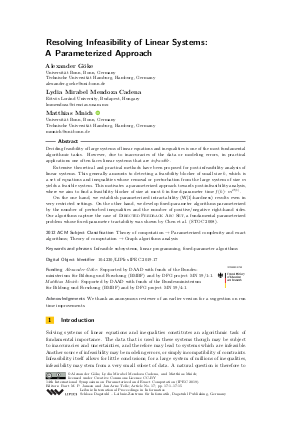@InProceedings{goke_et_al:LIPIcs.IPEC.2019.17,
author = {G\"{o}ke, Alexander and Mendoza Cadena, Lydia Mirabel and Mnich, Matthias},
title = {{Resolving Infeasibility of Linear Systems: A Parameterized Approach}},
booktitle = {14th International Symposium on Parameterized and Exact Computation (IPEC 2019)},
pages = {17:1--17:15},
series = {Leibniz International Proceedings in Informatics (LIPIcs)},
ISBN = {978-3-95977-129-0},
ISSN = {1868-8969},
year = {2019},
volume = {148},
editor = {Jansen, Bart M. P. and Telle, Jan Arne},
publisher = {Schloss Dagstuhl -- Leibniz-Zentrum f{\"u}r Informatik},
address = {Dagstuhl, Germany},
URL = {https://drops.dagstuhl.de/entities/document/10.4230/LIPIcs.IPEC.2019.17},
URN = {urn:nbn:de:0030-drops-114787},
doi = {10.4230/LIPIcs.IPEC.2019.17},
annote = {Keywords: Infeasible subsystems, linear programming, fixed-parameter algorithms}
}

 Creative Commons Attribution 3.0 Unported license
Creative Commons Attribution 3.0 Unported license

































